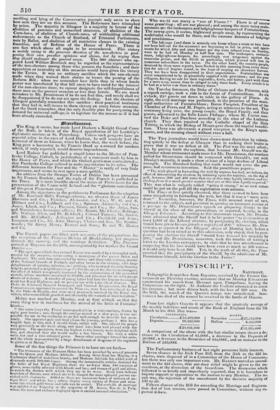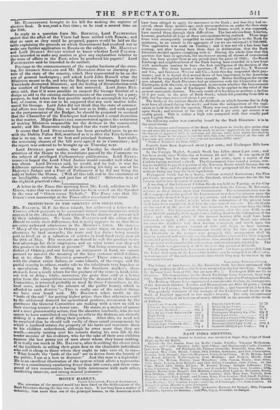The Parliamentary business of last night possesses little interest.. Seven
clauses in the Irish Poor Bill, from the 35th to the 411 In. elusive, were disposed of in a Committee of the House of Commons; but there was only one important vote. Mr. BARRON moved an amend- ment to the 42d clause, that out-door relief might be given to the ne- cessitous, at the discretion of the Guardians. The discussion which followed is so briefly and imperfectly reported, that it is hazardous to impute support or opposition to the motion to any Member. The re- sult was, the rejection of the amendment by the decisive majority of 133 to .50.
Fifteen clauses of the Bill for amending the Marriage and Registra- tion Act of last session, were passed in Committee, without any re- ported debate.
Mr. ELPHINSTONE brought in his bill for making the register of electors final. It wakread a first time; to be read a second time on the 16th.
In reply to a question from Mr. ROEBUCK, Lord PALMERSTON stated that the affair of the Vixen had been settled with Russia ; and that as soon as they could be prepared, papers would be laid on the table explaining the grounds on which Government had resolved not to nuke any further application to Russia on the subject. Mr. MACLEAN and Lord DUDLEY STUART wished to know whether Lord PALMER- STON intended to make any motion or give any explanation relative to the state of affairs in the East, when he produced his papers ? Lord PALMERSTON said he intended to do neither.
Previous to the commencement of the regular business of the even- ing, Sir GEORGE SINCLAIR and Mr. RICHARDS drew an alarming pic- ture of the state of the country, which they represented to be on the eve of general bankruptcy; and asked Lord John Russell what the Ministers meant to do, and why the Budget was not brought forward ? Everybody distrusted Ministers; and the feeling of dissatisfaction with the conduct of Parliament was all but universal. Lord JOHN Res. SELL said, that if it were possible to suspect Sir George Sinclair of a design to add to the existing embarrassments of the country for a party purpose, he had taken the best possible method to accomplish his end ; but, of course, it was not to be supposed that any such motive influ- enced Sir George. Lord John did not think that the state of commer- cial affairs was any thing like so bad now as in 1826; and with regard to the postponement of the Budget, he should be prepared to contend that the Chancellor of the Exchequer had exercised a sound discretion in that matter. Major BEAUCLERK remonstrated against the unfairness of making Ministers responsible for the distress in the commercial world ; and Mr. ROBINSON really hoped that the worst had passed.
It seems that Lord DUNCANNON has been prevailed upon to go on with the Dublin Police Bill, mutilated as it is after the Tory fashion— that is to say, in one of its best and principal features. Last night, the remaining clauses of the bill were agreed to in Committee ; and the report was ordered to be brought up on Thursday next.
Lord DENMAN gave notice, that on Tuesday he should call the attention of the House to the resolutions passed by the Commons on the subject of privileged Parliamentary publications. Lord ELLEN- BOROUGH hoped the Lord Chief Justice would consider well what he was about. Lord DENMAN said, he would, and he bad : it was his deliberate opinion that he should be deserting his duty as one of his Majesty's Judges and a Peer of Parliament if he (lid not bring tile subject before the Honse. [Will all this talk end in the enactment of an intelligible, rational, and just law of libel? Otherwise it is of the slightest practical rilue.]



























 Previous page
Previous page